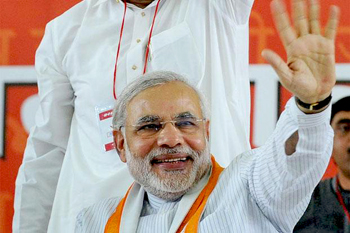New Delhi, Sep 16: The showstopper of Prime Minister Narendra Modi's US visit later this month may well be his meeting with Apple CEO Tim Cook in San Francisco. This could have implications far beyond the headlines it will generate. Apple, it is believed, is looking to invest in building manufacturing capacities in India, which could come as a huge boost for Modi's 'Make in India' project.
 While auto companies are already here, tech companies like Google don't really manufacture. Apple, if it comes, would be really into manufacture and signal Indian manufacturing capabilities.
While auto companies are already here, tech companies like Google don't really manufacture. Apple, if it comes, would be really into manufacture and signal Indian manufacturing capabilities.
The Cupertino-based company's sales of i-Phones in India grew 93% in the third quarter — albeit off a lower base — faster than 87% growth in Greater China markets. Apple uses manufacturing facilities of Foxconn, which has recently promised to invest $5 billion in manufacturing facility in Maharashtra.
It's believed that Apple may consider manufacture in India for third country markets. There is also talk that Apple might consider facilities in India to refurbish its products. Refurbishing is currently not allowed under India's industrial policy. There would be a demand from Apple to change that policy. It believes its refurbished products (phones, computers, tablets, laptops) have a big market in Asia. They draw a distinction between refurbished and second-hand products and believe that Apple products, if properly refurbished, have a much longer life than, say, Samsung or other similar products.
In fact, Cook will, in a unique coincidence, be meeting the heads of two biggest Asian powers in the same week. Cook may join other top US CEOs for an exclusive meeting with Chinese President Xi Jinping who will be touring the US around the same time as Modi.
As he prepares to sweep through New York and California, Modi has carefully chosen his meetings with US Inc in the same way he did last year. Time Inc, for instance, will be hosting a 100-guest dinner for Modi with chief executives from companies specializing in infrastructure and manufacturing. In 2014, Modi had promised action on land acquisition, GST and energy. This year, he will have to explain how he plans to find ways around as his government is still to deliver on two of these. Nevertheless, he will still be able to showcase a large number of reforms his government has undertaken in the past year.
J P Morgan will be doing an exclusive meet for 15 top CEOs from the financial sector with Modi while in a separate meeting, he plans to explore media and communication strategies with Rupert Murdoch of News Corp and others.
In California, Modi will be welcomed at the Tesla plant by the now iconic Elon Musk. He could ride the famous Tesla M, but then again, he might heed the caution of his own officials.
Mark Zuckerberg of Facebook will be doing a town hall meeting with Modi on September 27, which he announced on his Facebook page, and was "liked" by almost 75000 people. At the Google tent, Modi will be meeting Eric Schmidt and Sundar Pichai, though not Sergey Brin.
Apart from pushing the digital technology sector as he plans a big push to his 'Digital India' and 'Make in India' projects. While in manufacturing, India still has a way to go, it is now the new name in town in digital innovation and entrepreneurship, where government rules too are a lot more business-friendly.
The key themes that will dominate Modi's visit to the US this time are entrepreneurship and innovation. In his meetings, both in California and New York, India will seek to get a deeper sense of the opportunities it can harness, lessons to be learnt and the role governments can play in harnessing entrepreneurship. The Indian team will be looking for lessons on how to support the eco-system for disruptive digital technologies and innovations, including ways to be able to harness these for the welfare of those in the bottom of the pyramid.
A third theme running through Modi's visit this time will be renewable energy. He will not only hold a roundtable on the subject at Stanford University, but this will feature prominently in his conversation with US President Barack Obama in New York on September 28, weeks before world leaders gather in Paris for the climate change conference.





Comments
Add new comment